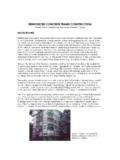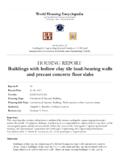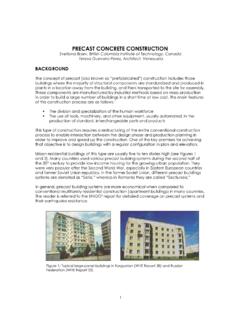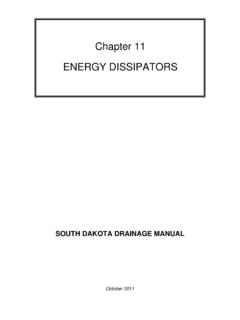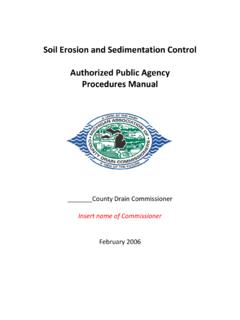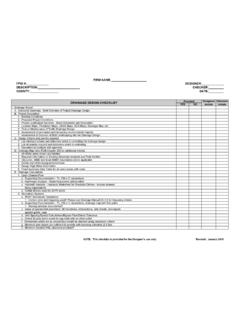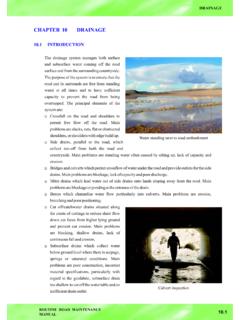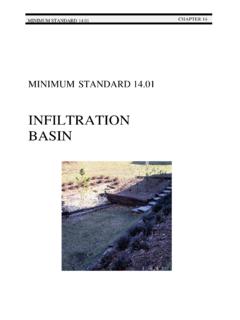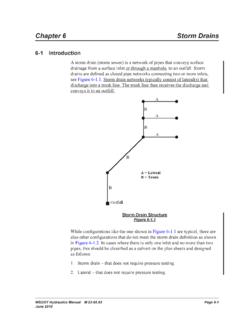Transcription of ADVANCED TECHNOLOGIES IN HOUSING …
1 ADVANCED TECHNOLOGIES IN HOUSING CONSTRUCTIONF arzad Naeim, John A. Martin Associates, USAS vetlana Brzev, British Columbia Institute of Technology, Canada BACKGROUNDA dvanced TECHNOLOGIES in HOUSING construction are not used as frequently as the more standard construction TECHNOLOGIES described in earlier chapters, which involve the use of masonry, timber, and concrete. However, as with other innovations, it is expected that over time these newer TECHNOLOGIES will gain wider acceptance. For purposes of the World HOUSING Encyclopedia, ADVANCED TECHNOLOGIES include seismic isolation and passive- energy dissipation devices. As of this writing, the WHE database contains three reports describing the applications of ADVANCED TECHNOLOGIES : two of them describe base-isolation systems from China (WHE Report 9) and Kyrgyzstan (WHE Report 76), and the third report describes the use of a seismic protection system developed in the former Soviet Union, called disengaging reserve elements (WHE Report 77, Russian Federation).
2 The first application of ADVANCED TECHNOLOGIES in HOUSING construction dates back to the 970s. For example, the sliding-belt isolation scheme was developed in Russia around 1975, with its first application in Kyrgyzstan in 1982. The disengaging reserve elements (DRE) were developed in Russia in 1970 and first applied in 1972. The first code addressing this type of construction was issued in 1981. In China, the widespread use of base isolation for HOUSING has only been employed since 1990, with the first code addressing this technology published in 2: Load-bearing wall buildings protected with a sliding-belt isolation system in Kyrgyzstan (WHE Report 76)Figure 1: Base-isolated brick masonry building with RC concrete floors and roof in China (WHE Report 9)SEISMIC ISOLATION (adapted from Mayes and Naeim 2001 )Seismic isolation is a relatively new concept in earthquake engineering, having been introduced in the early 1980s in the USA and New Zealand, and as early as 1975 in the former Soviet Union.
3 Quite simply, the idea underlying the technology is to detach the building from the ground in such a way that the earthquake motions are not transmitted up through the building, or are at least greatly reduced. Seismic isolation is most often 2 ADVANCED TECHNOLOGIES in HOUSING Constructioninstalled at the base level of a building and is called base isolation. This new concept meets all the criteria for a classic modern technological innovation: the necessary imaginative advances in conceptual thinking, new materials available to the industry, and as can be seen in the WHE reports using isolators, simultaneous development of the ideas principle of seismic isolation is to introduce flexibility at the base of a structure in the horizontal plane, while at the same time introducing damping elements to restrict the amplitude of the motion caused by the earthquake.
4 The concept of seismic isolation became more feasible with the successful development of mechanical energy dissipators and elastomers with high damping properties. Seismic isolation can significantly reduce both floor accelerations and interstory drift and provide a viable economic solution to the difficult problem of reducing nonstructural earthquake damage, as illustrated in Figure are three basic elements in any practical seismic isolation system. These are as follows: A flexible mounting so that the period of vibration of the total system is lengthened sufficiently to reduce the force response A damper or energy dissipator so that the relative deflections between building and ground can be controlled to a practical design level A means of providing rigidity under low (service) load levels, such as wind and minor earthquakesSeismic isolation achieves a reduction in earthquake forces by lengthening the period of vibration in which the structure responds to the earthquake motions.
5 The most significant benefits obtained from isolation are thus in structures for which the fundamental period of the building without isolation is short less than one second. Therefore, seismic isolation Figure 3: Vertical section through a base-isolated building in China (WHE Report 9) ADVANCED TECHNOLOGIES in HOUSING Construction3is most applicable for low-rise and medium-rise buildings and becomes less effective for high-rise WHE reports describe the applications of two different isolation systems: Rubber-based isolation system Sliding-belt isolation systemThe rubber-based isolation system has been widely used in China (WHE Report 9). The system consists of laminated rubber bearings, with a diameter of 350 mm to 600 mm and a thickness of 160 mm to 200 mm.
6 The isolators are reinforced by thin steel sheets. The isolators are installed on top of the basement walls or the columns, or at the plinth level in buildings without a basement. The most common application in China is for those buildings where the superstructure consists of common multistory, brick-masonry walls Figure 4: Rubber isolators used in China (WHE Report 9)Figure 5: Building elevation showing the locations of sliding bearings (undercolumns) and vertical stops (center of spans) (WHE Report 76, Kyrgyzstan)4 ADVANCED TECHNOLOGIES in HOUSING ConstructionFigure 6: Components of the sliding-belt system (WHE Report 76, Kyrgyzstan)with reinforced concrete floors/roof. The cost of this system is US$145/m2. By the end of 2003, the system had been used in over 460 residential buildings in China.
7 Sliding-belt isolation systems are installed at the base of the building between the foundation and the superstructure. The sliding belt consists of the following elements: (a) sliding supports, including the 2-mm-thick stainless steel plates attached to the foundation and 4-mm Teflon (PTFE) plates attached to the superstructure, (b) reinforced rubber restraints for horizontal displacements (horizontal stop), and (c) restraints for vertical displacements (uplift) vertical stops. Once the earthquake base shear force exceeds the level of the friction force developed in the sliding belt, the building (superstructure) starts to slide relative to the foundation. A typical large-panel building with plan dimensions m x m has 63 sliding supports and 70 horizontal and vertical restraints.
8 The sliding-belt scheme was developed in CNIISK, Kucherenko (Moscow) around 1975. The first design application in Kyrgyzstan was made in 1982. To date, the system has been applied in over 30 buildings in Bishkek, Kyrgyzstan. The applications include 9-story, large, concrete panel buildings and 3-story brick masonry wall the USA, New Zealand, Japan, and Italy, base-isolation technology has been used primarily to protect critical facilities, such as bridges, hospitals, city halls, courthouses, and heritage buildings. The most popular devices for seismic isolation of buildings in the USA are lead-rubber bearings, high-damping rubber bearings, and the friction pendulum system (FPS). In Japan, as of 1999, over 300 residential buildings were protected with base-isolation devices2 (note that there were 700 base-isolated buildings in Japan at that time).
9 Typical residential buildings are reinforced concrete frame or wall construction, more than 5 stories, perhaps containing hundreds of apartments. The majority of base-isolated residential buildings in Japan were built after the 1995 Kobe earthquake ( ), which caused over 6,000 deaths, mainly as a result of vulnerable older wood energy DISSIPATION DEVICESP assive energy dissipation systems represent an alternative to seismic isolation as a means of protecting building structures against the effects of damaging earthquakes. The basic function of passive energy dissipation devices in a building is to absorb or ADVANCED TECHNOLOGIES in HOUSING Construction5consume a portion of the earthquake input energy , thereby reducing energy dissipation demand on primary structural members and minimizing structural damage.
10 The means by which the energy is dissipated is either through the yielding of mild steel, sliding friction, motion of a piston or a plate within a viscous fluid, motion of an orificed viscous fluid device, or viscoelastic action of polymeric materials. The most common types of passive devices used-to-date include viscous fluid dampers, friction dampers, metallic dampers, and tuned mass dampers. These devices can be effective against wind motions as well as against and development of passive devices has a 30-year history. Most often, this technology has been used to retrofit existing public buildings that do not meet the seismic code requirements or were damaged by an earthquake. There are very few examples of the application of this technology to HOUSING construction.
